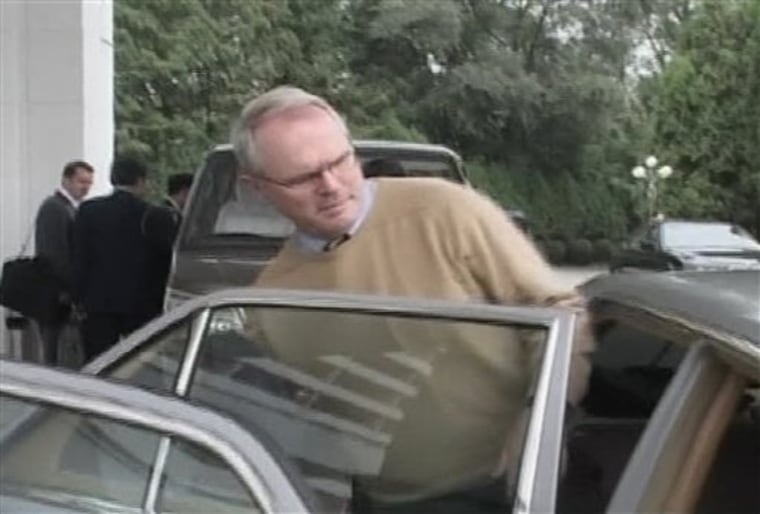U.S. diplomat Christopher Hill's trip to North Korea has not stopped the country from taking steps to restore its disabled nuclear reactor, State Department spokesman Robert Wood said Friday.
Assistant Secretary of State Hill returned to South Korea on Friday after a three-day mission to North Korea to defuse tension that has spiked in recent weeks following the North's moves to restart its nuclear program.
"The meetings were indeed very lengthy, indeed very substantive," Hill told reporters after talks with his South Korean counterpart, Kim Sook.
Hill refused to disclose further details, saying he first needed to report to U.S. Secretary of State Condoleezza Rice and the other nations in the six-party nuclear talks that also involve China, Japan and Russia.
"We had a lot of catching up to do and needless to say, there have been a lot of problems in the six-party process. So indeed, we did quite a substantial review of the activities in the last couple of months," Hill said, referring to North Korea's decision to reverse disarmament steps.
South Korean envoy Kim also declined to discuss specifics, but added, "We are in a situation where we need consultation with other nations." He did not elaborate.
Hill also briefed Japan's nuclear envoy, Akitaka Saiki, about the trip, and the Japanese diplomat told reporters he had the impression that the talks in North Korea "did not break down."
Hill said he held talks mainly with his North Korean counterpart, Kim Kye Gwan, but also met with North Korean Foreign Minister Pak Ui Chun and Gen. Ri Chan Bok, North Korea's commanding general at the Demilitarized Zone separating the two Koreas.
Abrupt stop
North Korea had began disabling its nuclear facilities at its Yongbyon complex as part of an aid-for-disarmament pact negotiated by the six nations, but abruptly stopped in mid-August, citing Washington's refusal to remove it from a terrorism blacklist. The U.S. maintains that the pact requires North Korea to submit to a thorough verification of its nuclear accounting — a demand rejected by the North.
"Obviously the issue in Yongbyon is an issue that has been great concern to us and obviously that was one of the points that I conveyed," Hill said, adding that he had no information on whether the North is still trying to restart the nuclear complex.
On Saturday, Hill is to travel to Beijing to brief Chinese officials about his North Korea trip.
North Korea's defiance comes amid concern about authoritarian leader Kim Jong Il's health. Kim, 66, has not been seen in public since he reportedly suffered a stroke in August.
In Washington, U.S. State Department spokesman Sean McCormack said Thursday that Hill did not present North Korea with any proposals for substantive changes to the verification proposal, but rather suggestions on how the "choreography" or timing of the process could be adjusted, perhaps by involving North Korea's main ally, China.
"There have been various plans in the past where instruments, declarations, et cetera, have been deposited with Beijing and then shared subsequently with the other five parties, while other commitments from the five parties move forward," McCormack said.
It was unclear Friday how North Korea reacted to the face-saving measure designed to salvage the disarmament pact.
"The ball is really in the North Koreans' court," McCormack said.
